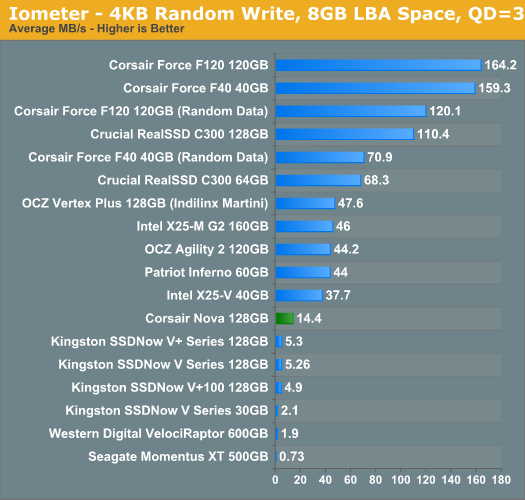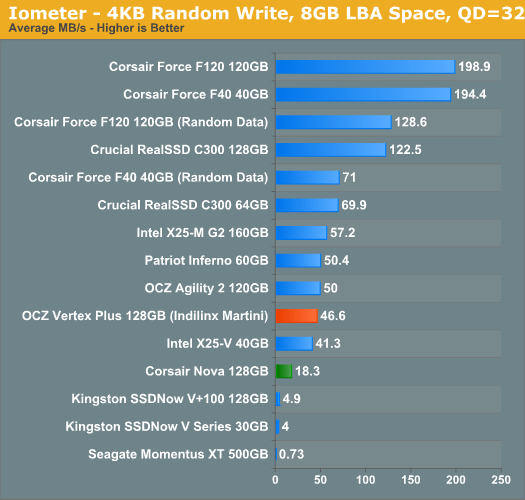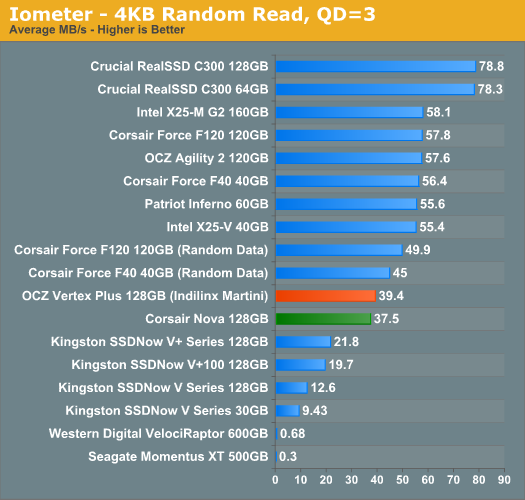OCZ Vertex Plus Preview: Introducing the Indilinx Martini
by Anand Lal Shimpi on November 16, 2010 9:31 AM EST- Posted in
- Storage
- SSDs
- OCZ
- Indilinx Martini
- Intrepid
Random Read/Write Speed
The four corners of SSD performance are as follows: random read, random write, sequential read and sequential write speed. Random accesses are generally small in size, while sequential accesses tend to be larger and thus we have the four Iometer tests we use in all of our reviews.
Our first test writes 4KB in a completely random pattern over an 8GB space of the drive to simulate the sort of random access that you'd see on an OS drive (even this is more stressful than a normal desktop user would see). As I've explained in the comments in previous reviews, simulating the type of random access you see in a desktop workload is difficult to do. Small file desktop accesses aren't usually sequential but they're not fully random either. By limiting the LBA space to 8GB we somewhat simulate a constrained random access pattern, but again it's still more random than what you'd see on your machine. Your best bet for real world performance is to look at our Storage Bench charts near the end of the review as they accurately record and play back traces of real world workloads.
For our random access tests I perform three concurrent IOs and run the test for 3 minutes. The results reported are in average MB/s over the entire time. We use both standard pseudo randomly generated data (data is random within a write, but duplicated between writes) for each write as well as fully random data (data is random within a write and random across most writes) to show you both the maximum and minimum performance offered by SandForce based drives in these tests. The average performance of SF drives will likely be somewhere in between the two values for each drive you see in the graphs. For an understanding of why the type of data you write to SF drives matters, read our original SandForce article.

The Corsair Nova is our Indilinx Barefoot representative in this preview and you can see how performance has improved with the Martini controller. While the original Indilinx Barefoot traded good sequential performance for slower-than-Intel random performance, Martini fixes the problem. It's not in the class of SandForce's SF-1200, but Indilinx appears to have built a performance equal to Intel's X25-M G2.
Many of you have asked for random write performance at higher queue depths. What I have below is our 4KB random write test performed at a queue depth of 32 instead of 3. While the vast majority of desktop usage models experience queue depths of 0 - 5, higher depths are possible in heavy I/O (and multi-user) workloads:

Our random read test is similar to the random write test however we lift the 8GB LBA space restriction:

Random read performance falls short of Intel and basically hasn't changed since the Barefoot. It's not bad at all, but not industry leading.










61 Comments
View All Comments
akedia - Tuesday, November 16, 2010 - link
The poster you are responding to said nothing about anyone "having 120GB SSD's or larger". He or she did, however, comment that "most of us have no interest in a drive smaller than 128GB". It's important to read ALL of the words people say before you criticize them.I think you'd be hard pressed to find a person who is more interested in a 64 GB drive than a 128 GB drive. Sure, you can find lots of people more interested in paying what it costs to own a 64 GB drive than a 128 GB drive, but that's a different issue. I agree with the poster before that few if any people are actually interested in drives that are smaller than 128 GB, but, like me, there are many of us who are forced to settle for them due to financial constraints.
To the original poster's point, since the market is rapidly moving to larger capacity drives, having benchmarks for smaller drives now would be of limited and temporary utility. Also, you must consider the fact that reviewers generally don't actually get to choose the drives they receive from manufacturers to review, and manufacturers have incentive to send out their faster performing flagship models than their slower, pint-sized brethren, now don't they?
jaydee - Wednesday, November 17, 2010 - link
Thanks for the lecture.So let me get this straight, even though the majority of SSD buyers can only justify getting a smaller drive, you think they'd rather see reviews of larger SSD's, even though they don't all scale down the same? You're just happy to guess on which 60GB performs better, as you as you can read reviews on drives you can't afford?
Of course it is. Every SSD review is of "limited and temporal utility". Most SSD's don't last a year in the market before they are succeeded. There was a roundup of three 30-40GB drives in the Spring. That was very useful for a time and still may be if/when one of those drives goes on a clearance sale. And like I said earlier, until/unless the price difference of ~120GB vs 60GB drives become negligable (or the next iteration of Windows demands it), there's going to be a large number of users that will still pick the smaller drive, so they can put the cost difference towards upgrading other components like CPU or GPU.
I have a very hard time believing that just about any SSD Anandtech wants to review is more than a phone call away.
akedia - Wednesday, November 17, 2010 - link
"So let me get this straight, even though the majority of SSD buyers can only justify getting a smaller drive, you think they'd rather see reviews of larger SSD's, even though they don't all scale down the same?"Nope. Not what I said. Perhaps I should have been more clear. Not only do you have to read ALL of the words someone says before you criticize, but you should read ONLY the words they actually said, and not respond to things they didn't say. I said nothing whatsoever about what reviews people would rather read, only pointing out that the previous poster had specified that they are interested in larger drives and that those reviews would be more relevant for longer, with the implication that that is a better use of a reviewers time.
"I have a very hard time believing that just about any SSD Anandtech wants to review is more than a phone call away. "
Try harder. Many of Anand's reviews start out by specifying which SSD he was sent, and putting that model in the context of their other offerings which he was not sent, including reviewing pre-production models knowing there will be changes before they ship from time to time. A: Anand doesn't have magical powers of SSD summoning, he does actually have to accept and work with the drives they send him for reviews, which most of the time are relevant samples but generally not complete collections of a company's offerings. B: Reviews take a lot of time, and even if they did send him every little sub-model he and his staff wouldn't have the time or inclination to benchmark every single one at the expense of all the other things they have to do.
You demonstrate very little understanding of tech review processes, focusing only on the fact that the drive you happen to want didn't happen to get reviewed, never mind the priorities of the companies in selecting models to send out, the limitations of even an influential reviewer like Anand regarding what samples he receives, and the further limitations of reviewing in a relevant manner. Sure, I agree, it'd be super neat if every single model in every single size with every single firmware revision from every single company was reviewed with the comprehensiveness and skill of Anand. Meanwhile, back in reality, I'm happy to have reviews of as many of the most relevant or interesting drives as he can get his hands on and has time to do. The model I purchased was determined by what I read here even though it wasn't specifically reviewed here. Your self-interest is preventing you from grasping the greater context and comprehensively understanding the limits of the situation you feel free to criticize.
jonup - Wednesday, November 17, 2010 - link
"I said nothing whatsoever about what reviews people would rather read, only pointing out that the previous poster had specified that they are interested in larger drives and that those reviews would be more relevant for longer, with the implication that that is a better use of a reviewers time."The original post started as a request for more reviews of smaller capacity drives. Do you agree or disagree? (Maybe why or why not would be fine.) Quit playing semantics.
"Many of Anand's reviews start out by specifying which SSD he was sent, and putting that model in the context of their other offerings which he was not sent, including reviewing pre-production models knowing there will be changes before they ship from time to time."
While this is applicable for pre-production models, I am sure of two things: 1) most manufacturers would like to get the publicity from anandtech.com and therefore, if requested, most of the time, they will provide Anand with any sample; and 2) anandtech.com generates enough advertising rivenue to allow them to go purchase retail samples for testing - the cost of retail samples would be easily repenished by the advertizing revenue it would generate.
And again the point of the original poster is to inquire about smaller capacity SSDs review. Do you agree or disagree? I personally would be happy to see more reviews of 60/64GB drives. I love my 80GB Intel G1 in my laptop. It provided enough space for fincial/business environment I use it for. 60GB would have been pushing it but would have done the job as well. It would also be enough for my bedroom PC.
jaydee - Wednesday, November 17, 2010 - link
Maybe you can stop belittling me, and stick with the topic? K? It's clouding what you're trying to get across.So you really think that if Anand (the premier SSD review on the web) calls up these manufactures and says he's doing a round-up of 60GB drives, they're going to say "sorry, we don't want you to review that one, you'll have to buy it yourself"?
Let's even assume, that that's the case. We already know from past reviews, that he's got a minimum of: 60GB Indilinx Barefoot(http://www.anandtech.com/show/3546), 64GB Marvell (Crucial C300), 64GB Sandforce (Patriot Inferno), 80GB Intel G2: (http://www.anandtech.com/show/4010/kingston-ssdnow... All that's really missing is Samsung and Toshiba. And this new Indilinx Martini. More than halfway there.
Every little sub-model (20+ different units) is irrelevant. I clearly stated one of every controller (of which there are maybe 6 major players) is all that's necessary.
I already have an SSD. My "self-interest" is being able to recommend which 60-80GB SSD's to fellow members on the forums (of which there are a multitude of questions regarding this), without having to conjecture based on piecemeal information and incomplete benchmarks from the links I posted above. This is a suggestion to this website, not a critizism (another misrepresentation on your part). I've been coming here since the Athlon vs Pentium III days and have been very grateful for what I've learned from Anandtech. This is the most informative, objective hardware review site on the web and this would improve it further.
melgross - Wednesday, November 17, 2010 - link
Exactly. I'm not denying that many people are buying smaller drives. But they're not thinking; Ooh, a 64GB SSD, just what I want! They're more likely thinking; Ooh, a 128GB SSD, just what I want, but I can't afford it, so I'll buy that crappy 64GB model I CAN afford.Even in the review of the MacBook Air here, 64GB was thought to be small, and 256GB was wished for as an upgrade to the 11.6" model, which doesn't offer it.
It's amusing that likely the same people who criticize Apple for not including an option for bigger drives think that these small SSD's are enough for themselves.
jaydee - Wednesday, November 17, 2010 - link
Not sure who you're referring to exactly, but if "said person" was talking about a 256GB SSD for a laptop with no other expandable storage, and a 60GB SSD for a desktop with a mechanical storage drive, I find no fault with this logic.
melgross - Wednesday, November 17, 2010 - link
I would be willing to bet you that vastly more people aren't buying ANY SSD because they are too small, and too expensive, and that goes for portable devices as well as desktops.I read a response or two about how many more people are buying small drives rather than bigger ones, and it means nothing. That's just the response of those who ARE buying these. If we took a poll of a sample of the average computer user, I would bet that almost none have bought any SSD yet.
I read about how people think how wonderful it is because they cut 15 seconds off their startup. Big deal! Does that really matter when you're using you computer for many minutes at a time? does it really add to your productivity that your programs open in one second rather than three? Of course not!
But those drives are too small to do what's really useful. That is, to open, save, and close big files quickly. The truth is that if you're doing work on small files, the time it takes to get those files is pretty fast even on a 7,200 rpm HDD. Even though an SSD is faster, it rarely is noticeable.
So, sure, some people THINK their 64GB SSD is really speeding things up for them, but in reality, it's not, because all of the heavy lifting is still being done from the HDD.
Once this changes, meaning the SSD is large and cheap enough, it will be different. But right now, buying a small SSD for a startup drive is less of a productivity tool than an ego booster. Sorry if that gets some people here mad.
jonup - Thursday, November 18, 2010 - link
You must not have an SSD. The 15 seconds (or more like 1+min) improvement in the time from power on to fully loaded and usable desktop or the benchmarks do not do SSDs justice. As Anand have said, you do not appreciate SSDs until you go back to HDD. I have Latitude D531 with a crappy Turion @ 1.9G with an 80GB G1 (Intel)in it. I have temporarily been working on an Latitude D820 which is the same laptop but with better C2D @ 2.1G CPU. The Intel powered laptop is intrusively slow compared to my regular AMD powered one. It does interefere with my productivity. I am constatntly caught waiting/resting for fraction of the second. It does not sound like much but is annoying and adds up throughout the day. And as far as capacity goes, what are you using your lappies for? Don't you have desktops for movies, games, music, whatever? Laptops are limited by nature in their performance; unless you compromise their mobility, which defeats the purpose.Which brings me to my next point of how fast SSDs are. I have 4-disk (mechanicle) RAID 0 in my desktop with a moderately overclocked P2. It is realy annoying when my dual core K8 laptop with an SSD inside finishes installing Windows Updates before the 3-core K10 at twice the frequency is done with setting up system restore point.
I also prefer RAID 0 so if a 60GB performs as fast as 120GB SSD and cost roughly half as much I would prefer two smaller drives to one large one at a slightly higher cost. However if the 60GB drive performs nearly half as fast as the 120GB drive it defeat the purpose of the RAID setup. From this stand point 60GB and 80GB SSD reviews would also be useful.
ABR - Wednesday, November 17, 2010 - link
As a laptop owner I sit around and wait for the 256GB prices to come down. 120GB IS too small, and the smaller sizes are obviously only useful for desktops where a secondary media drive can be installed. But are there really that many desktops out there anymore aside from in businesses and niche markets like gamers? That's probably why SSD volumes are low and prices are taking a long time to decrease.